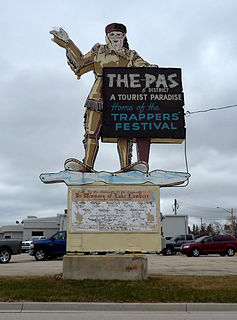
British Standards (BS) are the standards produced by the BSI Group which is incorporated under a Royal Charter. The BSI Group produces British Standards under the authority of the Charter, which lays down as one of the BSI's objectives to:
(2) Set up standards of quality for goods and services, and prepare and promote the general adoption of British Standards and schedules in connection therewith and from time to time to revise, alter and amend such standards and schedules as experience and circumstances require

Business continuity planning is the process of creating systems of prevention and recovery to deal with potential threats to a company. In addition to prevention, the goal is to permit ongoing operation, before and during execution of disaster recovery.

The Pas is a town in Manitoba, Canada, located at the confluence of the Pasquia River and the Saskatchewan River within Division No. 21 in the Northern Region. It is approximately 630 km (390 mi) northwest of the provincial capital, Winnipeg, and 40 km (25 mi) from the border of Saskatchewan. It is sometimes still called Paskoyac by locals after the first trading post, called Fort Paskoya and constructed during French colonial rule. The Pasquia River begins in the Pasquia Hills in east central Saskatchewan. The French in 1795 knew the river as Basquiau.

A listed building, or listed structure, is one that has been placed on one of the four statutory lists maintained by Historic England in England, Historic Environment Scotland in Scotland, Cadw in Wales, and the Northern Ireland Environment Agency in Northern Ireland.

The Institution of Civil Engineers (ICE) is an independent professional association for civil engineers and a charitable body in the United Kingdom. Based in London, ICE has over 92,000 members, of whom three quarters are located in the UK, while the rest are located in more than 150 other countries. The ICE aims to support the civil engineering profession by offering professional qualification, promoting education, maintaining professional ethics, and liaising with industry, academia and government. Under its commercial arm, it delivers training, recruitment, publishing and contract services. As a professional body, ICE aims to support and promote professional learning, managing professional ethics and safeguarding the status of engineers, and representing the interests of the profession in dealings with government, etc. It sets standards for membership of the body; works with industry and academia to progress engineering standards and advises on education and training curricula.

A Physician Assistant (PA) is a professional who practices medicine in collaboration or under indirect supervision of a physician, depending on state laws. Physicians do not need to be on-site with PAs and collaboration or supervision often occurs via electronic means when consults are necessary. Their scope of practice varies by jurisdiction and healthcare setting.
A Production Assistant, also known as a PA, is a member of the film crew and is a job title used in filmmaking and television for a person responsible for various aspects of a production. The job of a PA can vary greatly depending on the budget and specific requirements of a production as well as whether the production is unionized.

Anglo-American Cataloguing Rules (AACR) were an international library cataloging standard. First published in 1967 and edited by C. Sumner Spalding, a second edition (AACR2) edited by Michael Gorman and Paul W. Winkler was issued in 1978, with subsequent revisions (AACR2R) appearing in 1988 and 1998; all updates ceased in 2005.
BS 25999 was BSI's standard in the field of Business Continuity Management (BCM). It was withdrawn in 2012 and 2013 following the publication of the international standards ISO 22301 - ″Societal Security — Business continuity management systems — Requirements″ and ISO 22313 - ″Societal Security — Business continuity management systems — Guidance″

The Construction Industry Council (CIC) is the representative forum for professional bodies, research organisations and specialist business associations in the United Kingdom construction industry.

BSI Group, also known as the British Standards Institution (BSI), is the national standards body of the United Kingdom. BSI produces technical standards on a wide range of products and services, and also supplies certification and standards-related services to businesses.
ISO 55000 is an international standard covering management of assets of any kind. Before it, a Publicly Available Specification was published by the British Standards Institution in 2004 for physical assets. The ISO 55000 series of Asset Management standards was launched in January 2014.
Environmental governance is a concept in political ecology and environmental policy that advocates sustainability as the supreme consideration for managing all human activities—political, social and economic. Governance includes government, business and civil society, and emphasizes whole system management. To capture this diverse range of elements, environmental governance often employs alternative systems of governance, for example watershed-based management.
Sustainable event management is the process used to produce an event with particular concern for environmental, economic and social issues. Sustainability in event management incorporates socially and environmentally responsible decision making into the planning, organisation and implementation of, and participation in, an event. It involves including sustainable development principles and practices in all levels of event organisation, and aims to ensure that an event is hosted responsibly. It represents the total package of interventions at an event, and needs to be done in an integrated manner. Event greening should start at the inception of the project, and should involve all the key role players, such as clients, organisers, venues, sub-contractors and suppliers.
PAS 2060 is a specification detailing how to demonstrate carbon neutrality produced and published by the British Standards Institution.

OHSAS 18001, Occupational Health and Safety Assessment Series, is a British Standard for occupational health and safety management systems. Compliance with it enables organizations to demonstrate that they have a system in place for occupational health and safety. BS OHSAS 18001 is being replaced by ISO 45001, which was published in March 2018 by the International Organization for Standardization. Organizations which are certified to BS OHSAS 18001 should migrate to ISO 45001 by March 2021 if they want to retain a recognized certification.

Melchior Wathelet is a Belgian politician, Secretary of State of Environment, Energy, Mobility and Institutional Reforms, and member of the Centre démocrate humaniste (cdH). His father is Melchior Wathelet. He followed part of his secondary education in Dutch at a school in Bilzen,Limburg. After a degree in law from the Catholic University of Louvain and a Master of European Law from the University of Southampton, he became lawyer at the Bar association of Liège in 2002.
A virtual learning environment (VLE) in educational technology is a Web-based platform for the digital aspects of courses of study, usually within educational institutions. They present resources, activities and interactions within a course structure and provide for the different stages of assessment. VLEs also usually report on participation; and have some level of integration with other institutional systems.
British Standard 8878 is a Web Accessibility Code of Practice which was published by the BSI Group. The standard was officially launched on 7 December 2010.











